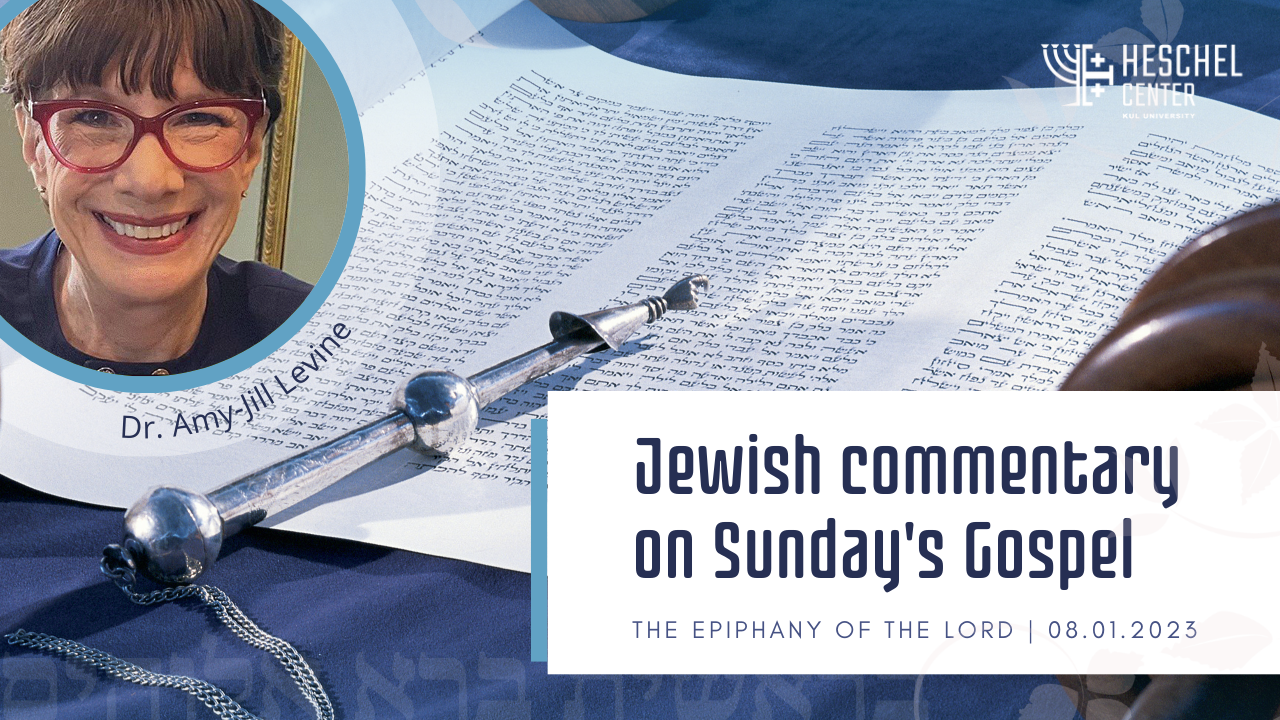Jewish Commentary on the Gospel


Photo: KUL Heschel Center
Along with gold, frankincense, and myrrh, the Magi offer us an additional gift: the Jews Mary and Joseph sharing hospitality with the gentile Magi. Matthew, chapter 2 offers a lesson in inter-religious cooperation,” wrote Amy-Jill Levine, professor of New Testament and Jewish Studies, in a commentary for the Heschel Center of the Catholic University of Lublin.
The Solemnity of the Epiphany, known in Polish tradition as the Three Kings’ Feast, is one of the oldest and most Christian holidays. It is usually celebrated on January 6, although in some countries, it falls on the first Sunday after January 1.
Full commentary:
Epiphany: Political Challenge, the Star of Bethlehem, and the Gifts of the Magi
Amy-Jill Levine
Political Challenge
Matthew chapter 2 opens with the phrase, “In the time of King Herod.” That word “king” asks readers to make a choice: to follow “King Herod,” Rome’s agent who ruled by violence, or to follow the new king, introduced in chapter 1 as the “son of David.”
When the Magi enter Jerusalem with the impolitic question, “Where is the child who has been born king of the Jews?” (2:2), they are denying Herod’s kingship.
While today’s lectionary suggests the Magi are kings, For Matthew’s first readers, the Magi represent not royalty but challenge to political authority. Several ancient sources record that Magi challenged the rule of the Persian king Cambyses in the sixth century BCE. The Magi in Matthew, seeking an alternative to King Herod, continue this tradition.
The Magi of Matthew 2 start to be associated with royalty after Constantine, seeing the Greek letters chi and rho in the heavens, converts to Christianity. The chi rho then becomes associated with the star of Bethlehem. The association had political benefits: just as the Magi, seen now as kings, paid homage to Jesus by following his star, so the kings of the earth should pay homage to the emperor by following his sign.
The Star of Bethlehem
Herod, summons the “chief priests and scribes” to ask them where the Messiah was to be born (2:4). They tell him that prophet Micah had announced that from Bethlehem “shall come a ruler who is to shepherd my people Israel” (2:5).
Matthew suggests that Magi’s knowledge of astrology is insufficient; they need Jewish wisdom to interpret fully what message the star is conveying. Indeed, the only time the word Magi appears in the Greek translation of the Old Testament is in Daniel 2:10, where King Nebuchadnezzar summons Magi not only to interpret his dreams, but also to describe them. They fail, and Nebuchadnezzar would have executed them all had not Daniel, knowledgeable in and faithful to the traditions of Israel, intervened.
Matthew also tells us that the star “stopped over the place where the child was” (2:9). Were a star, as we understand stars, to stop directly over a house, that earth would be incinerated.
People in antiquity thought of stars as living beings, whether as the souls of the righteous, or as angels. The star is a heavenly portent, not a science lesson. The story Matthew tells is not about science, it is about faith.
The Gifts of the Magi
Along with gold, frankincense and myrrh, the Magi offer us an additional gift. Magi in antiquity, and Magi to this day, are Zoroastrian priests. In our reading, the Jews Mary and Joseph sharing hospitality with the gentile Magi. Matthew chapter 2 thus offers a lesson in inter-religious cooperation.
About the author:
Dr. Amy-Jill Levine is a Professor of New Testament and Jewish Studies at Mary Jane Werthan University’s Vanderbilt Divinity School, Graduate Department of Religion and Department of Jewish Studies, as well as the Woolf Institute, Centre for the Study of Jewish-Christian Relations, Cambridge UK. She has delivered more than 500 lectures on the Bible, Christian-Jewish relations, and religion across the world. In the spring of 2019, she became the first Jewish woman to lecture on the New Testament at the Pontifical Biblical Institute in Rome; in 2021, she was elected a member of the American Academy of Arts and Sciences.
Hebrew commentary on the first Sunday of the New Year Gospel >>>
Jewish commentary on the Christmas Gospel >>>
Hebrew commentary on the Gospel for the Fourth Sunday of Advent >>>



Dodaj komentarz